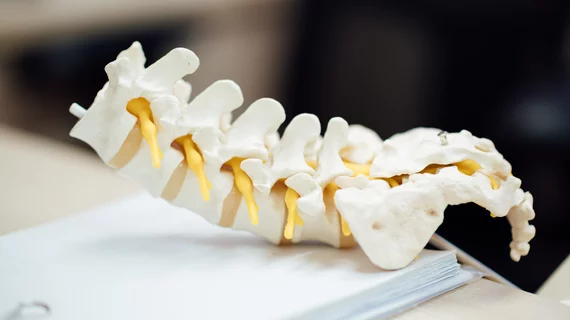Lumbar surgery AI planner, tracker gets regulatory green light
A machine learning system for planning spine surgery that also predicts post-op spinal alignment six months out has cleared the FDA’s 510(k) review process.
The OK went to Medtronic for a new degenerative spine algorithm within its UNiD Spine Analyzer v4.0 platform.
The algorithm enables surgeons to pre-plan operations on the lumbar spine and track patients longitudinally, checking results of the surgery as the spine compensates over time, according to a Medtronic announcement sent July 14.
The company says the tracking function combines serial X-ray follow-ups with patient-reported symptoms or symptom relief.
The new update also includes improvements to pediatric and adult spinal-deformity algorithms, Medtronic says, adding that it’s the first and only company to offer FDA-cleared predictive models for spine surgery.
“[W]e have expanded our UNiD Adaptive Spine Intelligence (ASI) technology to include hardware and software solutions dedicated to helping spine surgeons treat degenerative spinal pathologies, where the majority of spine surgery is performed,” comments Dan Wolf, a VP and GM in Medtronic’s neuroscience business.
The company says its UNiD ASI platform uses a database of more than 10,000 surgical cases to train and refine algorithms for visualizing various permutations. Prior to operating, surgeons can use the visualizations to customize technical interventions and personalize care plans.
News release here.
More Coverage of Lumbar Imaging:
Low back imaging: All-in-one MR makes strong showing vs. added CT
Radiologists grab majority share of growing lumbar puncture market, with more on the horizon
Wide variation in musculoskeletal imaging charges, including 74-fold difference for one CT exam
Patients poorly understand common terms in imaging reports, potentially leading to low-value care
Radiologists can help drop unnecessary opioid prescriptions with low-cost imaging reporting change
When incidental renal lesions are discovered on lumbar spine MRI, what is the next step?
Lumbar spine MRI reports too complex for patients to understand
AI detects lumbar vertebrae in MRI images with 98.6% accuracy
Providing plain language and context in spine imaging reports helps drop opioid prescriptions
Researcher on the Trail of the ‘Poster Child’ for Imaging Overutilization

